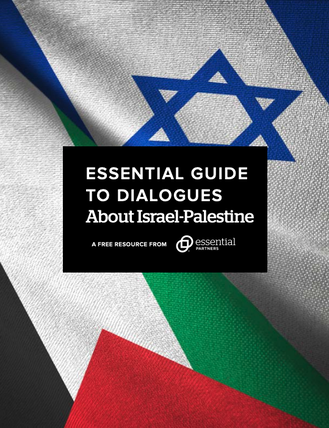 NCDD member org, Essential Partners, announced their new publication, Guide to Dialogues About Israel-Palestine, to actively equip those interested in facilitating dialogues in various settings. This guide emphasizes the importance of respecting diverse perspectives without compromising identities or advocating extreme viewpoints, recommends skilled facilitation for highly polarized situations, and extends support to both trained and untrained facilitators. Its ultimate goal is to cultivate open, hopeful, and caring dialogue spaces amidst complexity and differences. Learn more below and on EP's site here.  Talking About Israel-Palestine Six months ago, the trajectory of just about every Essential Partners collaboration changed overnight. The attacks by Hamas and ensuing Israel-Hamas War in Gaza polarized schools and colleges, faith institutions and nonprofits, grassroots groups and civic organizations in public and painful ways. Rarely have we seen a single issue prompt so much turmoil, so quickly, in so many different spaces. It has left people questioning their identities, their allegiances, and their values, all of it amid a rising tide of ethnic and religious bigotry. But we were not unprepared. Essential Partners has helped communities talk about Israel-Palestine for three decades. We drew upon that experience and leaned into the power of our dialogue framework to support current and former partners, as well as the many people who reached out to us in crisis. Our new free Guide to Dialogues About Israel-Palestine reflects the sum of our experience, the wisdom of our partners, as well as our hope for your community and the world. This guide contains everything you might need to lead dialogues in numerous contexts, including religious institutions and college campuses. As always, we do not ask people to change their views or compromise their identities. We do not require people to leave their authentic experiences and commitments behind, or hide their perspectives. We do not ask that you give up your advocacy. We also do not suggest that you must engage with the most extreme proponents of a movement or cause. Polarization paints everyone as a representative of one side or the other. Dialogue invites us to re-engage with the complexity and individuality of each human being. Dialogue has the greatest impact among members of an existing community, such as congregants in a synagogue, mosque, or church; students and faculty on a campus; or colleagues in an organization. When we break cycles of polarization in these spaces, we begin to live, work, worship, and learn better together—even across uncompromising differences. For situations of extreme polarization, a skilled facilitator may be necessary. EP offers regular workshops to train facilitators in our Reflective Structured Dialogue approach. There may also be times when an external facilitator is needed. To that end, we offer direct facilitation services as well as more in-depth, longer-term collaborations. Reach out to us for help, we are here for you. However, many people will not require training to use this guide—just comfort and skill in working with groups, an ability to support participants with diverse perspectives, and a willingness to hold space during difficult moments. Whether you have never done anything like this or you are an experienced facilitator, we hope you find what you need here. Finally, try to embrace the messiness and humanity of this moment. You and others will make missteps. People will have different levels of understanding, varied experiences, and identities that inform their perspectives. Some comments may be hard to hear. Aim to create a space of openness, hope, and care. Whatever other people may bring, invite them to meet you in that space.
0 Comments
Your comment will be posted after it is approved.
Leave a Reply. |
Categories
All
|
||||||
Follow Us
ABOUT NCDD
NCDD is a community and coalition of individuals and organizations who bring people together to discuss, decide and collaborate on today's toughest issues.
© The National Coalition For Dialogue And Deliberation, Inc. All rights reserved.
© The National Coalition For Dialogue And Deliberation, Inc. All rights reserved.

 RSS Feed
RSS Feed